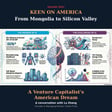
How to Choke Your Enemy: Why America Turned the World Economy into its Weapon of Global Domination
How should America choke enemies like Iran, Russia and China? Not on the battlefield—according to Edward Fishman, that’s yesterday’s game. Today, Fishman argues in Chokepoint, America has turned the world economy into its weapon of global domination. In his bestseller, already shortlisted for the FT’s best business books of the year, Fishman reveals that 21st century American power relies on economic warfare. From Treasury Department lawyers weaponizing the dollar-based financial system to Silicon Valley’s semiconductor stranglehold, sanctions, export controls and financial coercion have replaced military force as America’s primary tools of statecraft. Every U.S. president this century has doubled their predecessor’s use of sanctions—a staggering escalation that has fundamentally reshaped the global economic order and may ultimately lead to less interdependence and, paradoxically, more military conflict. But what about Trump’s tariffs? According to Fishman, Trump has made two critical errors: weaponizing America’s economic power against allies like Europe, Canada and India rather than just adversaries, and relying on import tariffs—where the U.S. controls only 13% of global imports—instead of the true chokepoints where America dominates 90% of foreign exchange transactions and 80% of advanced AI chips. So it is Trump himself who has choked rather than successfully choking America’s enemies.
1. Every US President This Century Has Doubled Sanctions Usage The escalation is relentless and bipartisan: from George W. Bush to Obama to Trump’s first term to Biden, each administration imposed sanctions at twice the rate of their predecessor—revealing economic warfare as a defining trend of 21st century American power, not a partisan aberration.
2. The Dollar System is America’s True Superweapon The US doesn’t need naval blockades anymore. Because the dollar is involved in 90% of global foreign exchange transactions, America can choke off countries like Iran simply by threatening banks, oil traders, and refineries worldwide with exclusion from the dollar-based financial system—making economic warfare both more powerful and more invisible than traditional military force.
3. Trump Weaponized the Wrong Tools Against the Wrong Targets Trump broke with predecessors in two critical ways: he’s using economic warfare against allies (Europe, Canada, India) not just adversaries, and he’s relying on tariffs where the US controls only 13% of global imports instead of leveraging the true chokepoints—the dollar (90% of forex) and semiconductors (80% of advanced AI chips)—where American dominance is overwhelming.
4. Economic Warfare Isn’t Bloodless—It Creates Real Human Suffering Sanctions designed for coercion must inflict broad macroeconomic harm: inflation, currency debasement, unemployment. Fishman warns against treating these tools as cost-free alternatives to military action—they should only be deployed when vital national security interests are at stake, like stopping Russian imperialism in Ukraine, not for routine diplomatic leverage.
5. The “Geoeconomic Impossible Trinity” Means Decoupling is Inevitable Only two of three factors can coexist: economic interdependence, economic security, and geopolitical competition. Since US-China and Europe-Russia rivalry isn’t disappearing, interdependence must unravel over the next decade. The danger: when countries can’t secure resources through trade, history shows they turn to conquest and imperialism—meaning economic warfare could paradoxically lead back to militar










